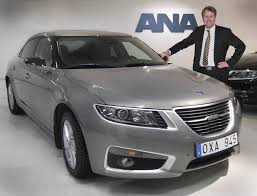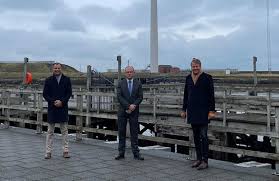- Dark speak easy part one - 18th February 2026
- X marks the spot again - 17th February 2026
- Wordy again part three - 16th February 2026

New doubts about a high-profile Chinese policy have highlighted exclusive revelations by The Eye that a battery firm which pulled out of Wales was part-founded by an associate of a fraudster.
The news that controversial BritishVolt (BV) was coming to Wales was greeted with wild acclaim in the mainstream media, but it soon scrapped the plans, and the company has since gone into administration.

Now it has emerged that question marks have been placed over the strength of Chinese projects – with the country dominating the trade in the battery component Lithium.
A clutch of firms are now making batteries based on Sodium, Lithium’s elemental cousin.
Since Sodium’s chemical properties are very similar to those of Lithium, it too makes for good batteries.
Sodium is found in the salt in seawater, and is thousands of times more abundant on Earth than Lithium and cheaper to get at.

Policy-makers are wary of China, so for them pursuing the technology in the West might be a surer route to energy security than relying heavily on Lithium.
But it isn’t simply Lithium.

In a weekly intelligence briefing on China’s much-vaunted Belt and Road Initiative (BRI), a leading critic questions its effectiveness in harnessing developing countries to the country’s communist methods. Jacob Mardell who has studied the BRI for many years has said: “There is little strategic coherence”.
Critics have also doubted the reliance on Chinese Lithium, as it is believed other (perhaps man-made) basic ingredients will be found for batteries in future like Sodium

All of this puts centre stage our disclosures about BV.
The Eye were alone in raising major questions about BV but huge fanfare greeted their scrapped plan to come to a former RAF base in Bro Tathan near St Athan for its battery factory. This reversal came despite the fact that the ‘Chief Executive’ at the time (Orral Nadjari) claimed he had looked at more than 100 sites.


Investigations by our journalists at Companies House (CH) and elsewhere, disclosed that a prominent director of BV at the beginning was Couroush (or Courosh) Alai who until recently lived in a modest apartment at Lily Street in Cardiff, which appeared to be a terraced house converted into flats.
The organisation’s original Chairman and co-founder, Lars Carlstrom, had been involved in a coach company at Coventry that was in debt to creditors for around £1 million. He had also been director of a watch manufacturer called Thrupp and Maberly which has now been dissolved.

In 2011 it had first come to light that Mr Carlstrom was the “representative in Sweden“ of Vladimir Antonov who had been jailed for fraud. Mr Carlstrom was involved, too, in a sale and leaseback deal of property and plant belonging to the Swedish car maker Saab.
At an extradition hearing, the former ‘representative’ of Mr Carlstrom, Russian-born Mr Antonov, who once owned Portsmouth FC, said that the charges against him were part of a politically-motivated plot. Mr Antonov, whose father was shot and injured in Russia in 2009 over a suspected business dispute, claimed that he was at risk of attack in prison if he was sent abroad to stand trial. Apart from dubious associations such as this, Mr Carlstrom was also handed a four-year trading ban in the late 1990s, and later, too, was accused of acting negligently by Sweden’s tax authority over a separate unpaid bill for one of his companies in 2011. In leaving BV, he said: “I don’t wish to become a distraction”.

After all of this, BV’s Chief Strategy Officer, Isobel Sheldon, said the operation was severing ties with Mr Carlstrom.
Meanwhile before the announcement that the new plant would be built in Northumberland as opposed to South Wales, Mr Nadjari had declared brazenly: “The first UK gigaplant will… be in an alternative location (to South Wales) which we will be announcing soon”. But even this was not to be, because BV then went belly-up altogether.
The past of the man who took over the assets of BV (Australian David Collard), some could think questionable as well. Although they do not appear on his website, he registered two cannabis brands in Australia, one called Cannabis Collective, with another entitled Australia Weed Co, and a third, Smoko, for a further possible venture. Mr Collard, who comes from Geelong, was investigated by the Sunday Times (ST), which painted a picture of a man who was long on ambition, but possibly short on experience for an executive who wanted to spend billions of dollars building gigafactories.

Yet this sort of information appears to fit BV’s alarming past – despite its supposed launch in Wales being warmly welcomed by senior politicians and the mainstream media.
For example, the former Secretary of State for Wales, Simon Hart MP, said it was “fantastic that we can talk about Wales as being a leading contender” for the UK’s first gigafactory. Colleagues of Mr Hart, who were even more important, also backed the company. BV was once touted by one-time Prime Minister Boris Johnson as a key part of his green industrial revolution, but its £4 billion project in the North East of England (after plumping for a site there instead of one in South Wales) came close to collapse more than two years ago.

Most of the media (apart from The Eye), also joined in with the hoopla when BV was supposedly coming to Wales. BBC Cymru Wales (BBC CW) declared: “The firm behind a proposed battery factory which could create 4,000 jobs has listed a site in Wales as its ‘preferred option’”.
The website WalesOnline (WO) published: “Plans for a giant factory and thousands of jobs for the Vale of Glamorgan have been revealed. Battery manufacturer Britishvolt announced … that two sites are in the running for their factory, with Bro Tathan business park (near St Athan) leading the way”. It stated later: “Plans for a factory producing electric car batteries that would bring thousands of jobs for the Vale of Glamorgan have moved a step closer.”.


This was The Times: “Ambitious plans have been revealed for Britain’s first gigafactory capable of producing enough fuel cells and battery packs to power 100,000 zero carbon electric cars. The project in south Wales, which is designed to put the UK in the race to be a global hub for the electrified vehicle industry, comes from Britishvolt, a start-up company founded by a Swedish automotive entrepreneur best known as a former associate of Vladimir Antonov, the jailed Russian businessman. Britishvolt has unveiled plans to build a gigafactory capable of producing 10 gigawatt hours (GWh) of lithium ion batteries a year from early next year at Bro Tathan, on the Cardiff airport commercial complex where Aston Martin Lagonda has opened its new carmaking factory.”

The scheme for South Wales, though, was soon stopped by BV, yet crucial facts about the men behind it could have been easily discovered. Perhaps emphasising what happened, our research could find no record of any director having a background in battery manufacturing.
When BV pulled out of Wales there was widespread disappointment. For instance, Neil Moore, leader of Vale of Glamorgan council said: “They were given a better deal elsewhere. I was surprised when they pulled out”.

BV had apparently acquired the Blyth site over the Welsh alternative because of better connections to renewable power sources such as windfarms in the North Sea, as well as an interconnector to Norway’s hydroelectric power – with timing difficulties in Wales also allegedly a factor.
Others, though, thought different issues were at work, and in the way the news of the ‘alternative location’ (Blyth) was welcomed, there would seem to be an uncanny echo of what happened in South Wales.

The Blyth Valley MP, Ian Levy, stated at the time: “This is an incredibly exciting announcement that will have a massive impact in the constituency and the surrounding area for decades to come”. Unfortunately there would be no massive impact for the area or for anywhere else.
In the ST it was published: “Britishvolt’s inevitable journey towards disaster has been, well, a very British story…The electric car battery factory planned for Blyth, near Newcastle, had no customers and no products. One of its founders had no automotive experience. The other had a conviction for tax fraud in the 1990s. Britishvolt wanted millions of taxpayers’ pounds for its gigafactory”.
 As this report alludes to, the UK Government had committed a total of £100 million worth of taxpayers’ money to BV for the project, and it is understood the firm wanted to draw down nearly a third of the funding early, but officials refused.
As this report alludes to, the UK Government had committed a total of £100 million worth of taxpayers’ money to BV for the project, and it is understood the firm wanted to draw down nearly a third of the funding early, but officials refused.

With this sort of background, the recent information about the man taking over part of BV came as no surprise to critics of the scheme online, and as the website North East Bylines (NEB) had put it about Mr Carlstrom earlier: “He was the same individual whose track record had been queried by The Eye when reviewing the proposed location in Wales in July last year, and who seems still to be a major shareholder”.

But as the report showed, our research featured in publications in the North East of England after the firm had proclaimed that it would not, after all, build the St Athan plant in the Vale of Glamorgan and move to Blyth instead.
The website said: “In July 2020 this (the plans for the battery factory) seemed a welcome bonus for Wales and the prospects of a large new green manufacturing capability with thousands of jobs could only be good news. Except, however, when doubts were quietly raised by The Eye, an investigative news and journalism website ‘looking into misdemeanours by organisations and individuals in Wales and the UK’”.

Perhaps we should also look into Chinese policies after question marks about them were raised…










